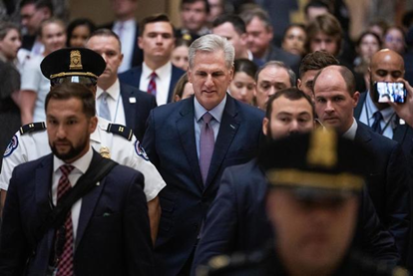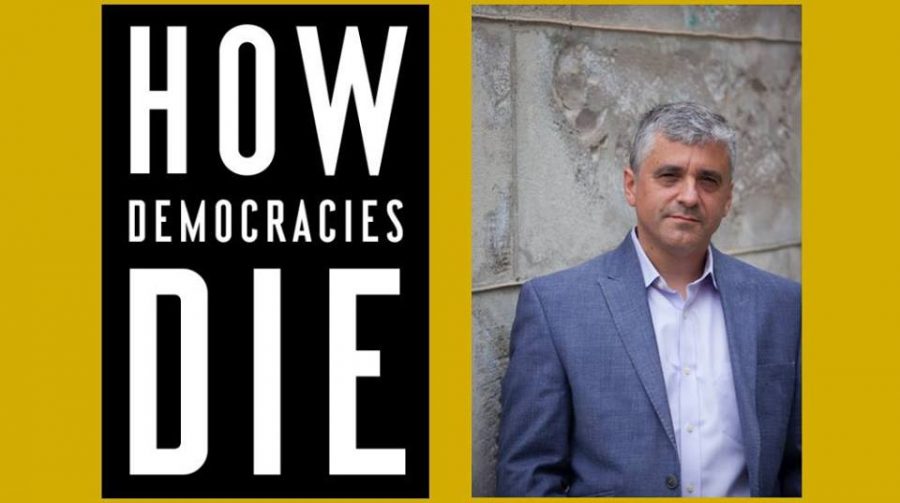
Tuesday Oct. 3, for the first time in congressional history, the House of Representatives has officially voted to remove the Speaker of the House. After a tense vote, California’s Republican Representative Kevin McCarthy is removed from his role as Speaker of the House. Past Speakers have stepped down from the role, but never in the midst of a Congressional term has a Representative been removed by vote. All Democrats present voted in favor of his removal. Eight Republicans voted alongside them, one of those Republicans being Florida’s own Matt Gaetz, who did not support McCarthy’s election as Speaker of the House back in January. I spoke with two Stetson students to gauge their opinion on the historic events, and get the college perspective on congress.
Representative McCarthy’s history as Speaker of the House has strained beginnings; it took McCarthy fifteen rounds of voting to earn his spot as the speaker. In January 2023, four days of voting in Congress led to tensions within the Republican party. Representative McCarthy struggled to gain support and allyship from his fellow Republicans. During the fourteenth round of voting, it was Matt Gaetz who notoriously voted against McCarthy in what should have been the final vote after misleading McCarthy; Gaetz confirmed with McCarthy prior to the vote that they were on the same page, however in the midst of the vote he voted against McCarthy. In the fifteenth round McCarthy succeeded after promising Republicans to push a conservative-friendly agenda. Now, McCarthy makes history with his removal after serving only nine months as the Speaker of the House.
Patrick McHenry, Republican from North Carolina and chair of the Financial Services Committee, has been elected the interim speaker until a new leader is elected. McHenry was listed as the first Representative to take McCarthy’s place; since 2003, it has become a rule that the Speaker of the House must submit a list of Representatives to take the leadership role if the Speaker has to leave their role in Congress.But what does this mean for the House of Representatives moving forward? Legally, Kevin McCarthy could run for reelection as Speaker of the House. However, McCarthy spoke to the press after leaving Congress, where he confirmed he will not be running for reelection. If not McCarthy, and not McHenry, then who?
Connor Pearl ‘25, Accounting and Political Science major, weighed in: “it raises the question as to who will become the next speaker… Hakeem Jeffries, the Minority Leader, doesn’t have the support to become speaker. He’s really the only other potential candidate in my mind, but he just doesn’t have . . . Republican support.” Is this true? Does Hakeem Jeffries have very little support in congress to run for election as Speaker? Indeed, the Republican parties do not favor Jeffries. Representative Jeffries told the press Tuesday night that the Democratic party is ready and willing to work with the Republican party to find a resolution, but it is “on them to join us in moving congress and the country forward.” Jeffries could attempt a run, but is unlikely that a Democrat would get voted in.
McHenry hypothetically has the same political role that McCarthy had as the elected Speaker, but not the same powers. McHenry can neither bring legislation to the house floor, nor take legislation off the floor. Because of this, his first order of business will likely be kickstarting the election for the next Speaker. The House can begin the election process for a new Speaker of the House as soon as necessary. It is vital that a candidate is elected soon, as the role of Speaker of the House can be one of the most powerful in the government. This is because the Speaker has the ability to rally party members behind their agenda and control some of the chaos in the House of Representatives through given jurisdiction.
Without a confirmed Speaker of the House there could be a storm brewing in the distance for legislative action. Stetson Political Science major Serena Dowling ‘26 says that the divisions within the Republican party will lead to “turmoil [creating] a lot of divisions” within congress. She was hesitant on whether the Republican party will remain unified or not in the next vote. Without the Speaker of the House to oversee Congressional processes within the House, the next few weeks could be unproductive for the American people. At this time, there is no obvious Republican candidate to take on the election.

















